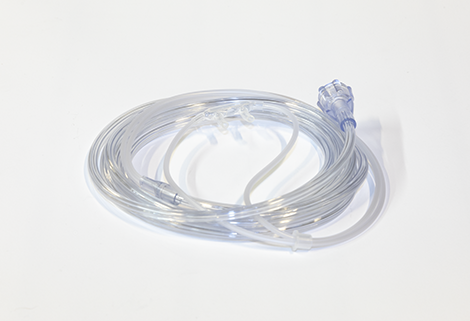S0370115
Prongs,nasal,Oxygen,child,s.u.
Prongs, nasal, Oxygen, child, single use
Synonym: Oxygen nasal cannula
Indicative Price 0.32 USD
GENERAL DESCRIPTION
Prongs, nasal, Oxygen, child, single use
Synonym: Oxygen nasal cannula
TECHNICAL SPECIFICATIONS
Nasal cannula (nasal prongs), device designed for easy administration o foxygen into the patient nose through two small prongs placed in the nostrils, providing comfort for the patient.
The device consists of:
Soft twin prongs nasal tips to ensure equal oxygen flow to both.
Adjustable, smoothly finished nasal tips for maximum patient comfort.
Star lumen main tube to avoid accidental blockage.
Over-the-Ear tubing adjustable
Soft funnel shaped connector to facilitate easy connection to oxygen source.
Length of the oxygen tube: +/- 2 m.
Material: Preferably soft and kink resistant polyvinyl chloride (PVC).
Size selected: Child
Single use.
Non-sterile.
PACKAGING AND LABELLING
Primary packaging: unit of use
One (1) Nasal prongs in a plastic bag.
Over packaging: Packaging unit.
WEIGHT/VOLUME (packaged):
Estimated weight: 0.091kg
Estimated volume: 0.53cdm
INSTRUCTIONS FOR USE
Nasal cannula used to deliver oxygen directly to the patient via two small prongs placed in the nostrils
Place the twin prongs inside the nostrils and secure them with a piece of tape on the cheeks near the nose and adjust the harness (Over-the-Eartubing).
Care should be taken to keep the nostrils clear of mucus, which could block the flow of oxygen.
Set a flow rate of 1-2 l/min (0.5 l/min for young infants) to deliver an inspired oxygen concentration of 30-35%.
It is important to have the proper equipment to control low flow rate.
Humidification is not required with nasal prongs.
Others sizes available:
S0370105 - Prongs, nasal, Oxygen, adult, single use.
S0370125 - Prongs, nasal, Oxygen, neonate, single use.
STORAGE CONDITIONS
Avoid storage at extreme temperatures and humidity levels.
SAFETY CONSIDERATIONS
Nasal cannula for single use only.
After use: collect and destroy by incineration in a controlled environment.
REGULATION & CONFORMITY REQUIREMENTS:
CE mark conforming to Medical Device Directive 93/42/EEC
CE Certificate (class IIa or higher )
CLASSIFICATION:
93/42/EEC Risk class IIa or higher– CE certificate
SAFETY & PRODUCT STANDARDS:
Must comply with the following standards:
ISO 13485:2003 Medical devices -Quality management systems -- Requirements for regulatory purposes
Related Products





